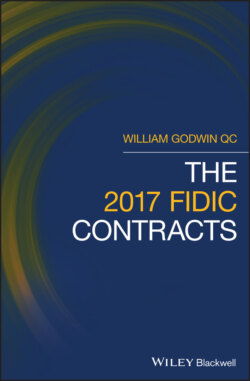Читать книгу The 2017 FIDIC Contracts - William Godwin - Страница 52
3.2 The Engineer/Employer's Administration
ОглавлениеAs already mentioned in Section 1.2.1 above, the Engineer in both editions of the Red and Yellow Books has a central role. He is involved in all aspects of the project from start to finish and its success or failure depends significantly on his willingness and ability to perform his duties properly. In the FIDIC contracts those duties are essentially twofold:
1 (i) the Engineer administers the Contract, being responsible for such matters as certifying payments and taking‐over of the works, monitoring progress, instructing variations, inspecting and attending the Contractor's testing, including tests on completion; and
2 (ii) the Engineer has the function of seeking agreement on or, in default, determining various matters arising under the Contract including extensions of time, adjustments to the Contract Price for variations and a range of other matters.
Clause 3 in the 2017 Red and Yellow Books sets out the authority, functions and duties of the Engineer in far more detail than under the same clause of the 1999 editions. Noticeably, whereas under the 1999 editions the Engineer was required under clause 3.5 merely to consult the parties in order to seek to reach agreement and, if agreement was not achieved, to make a fair determination in accordance with the Contract, taking due regard of all relevant circumstances, clause 3.7 of the 2017 Red and Yellow Books sets out a detailed step‐by‐step process with time limits and deeming provisions for the Engineer to agree or determine a matter and involves him far more closely in seeking to facilitate agreement and to resolve issues as they arise.
Under the 2017 Books the Engineer's determinations are also to be fair, in accordance with the Contract and take account of all relevant circumstances but he is also now expressly required to act neutrally between the parties in discharging his functions under clause 3.7 and is not to be deemed to act for the Employer in doing so, thus affecting the process as well as the outcome of a determination.1 The Engineer's enhanced role in the 2017 editions reflects the greater emphasis placed on active project management and the avoidance of disputes. The qualities of the Engineer, his powers and authority, including appointing a Representative to act on his behalf at the site, are set out more clearly and fully in the two new Books and are considered in Section 3.2.1 below.
Instead of an Engineer, the Employer in the 2017 Silver Book must appoint an Employer's Representative. Unlike the 1999 edition, this is no longer optional for the Employer. The Contractor's Representative now has a single point of contact during the course of the project, including when instructions are issued, and the Employer's Representative alone is now responsible for agreeing or determining claims and other matters under clause 3.5 of the 2017 Silver Book.2
The procedure for dealing with claims and other matters set out in clause 3.5 of the 2017 Silver Book is the same as in clause 3.7 of the other two Books, and the qualities of the Employer's Representative, his powers and authority are similar to those of the Engineer, as described in more detail below. One significant difference, however, is that the Employer's Representative is not required to act neutrally in carrying out his duties under clause 3.5 whereas the Engineer is so required, under clause 3.7 of the other two Books; the Employer's Representative is, however, still not to be deemed to act for the Employer in discharging these duties and any determination he makes must also be fair, in accordance with the Contract and take due regard of all relevant circumstances.
